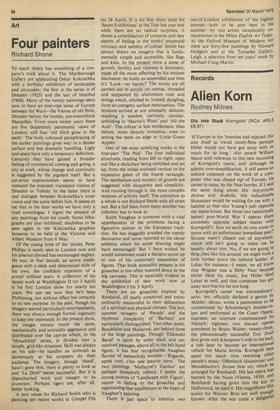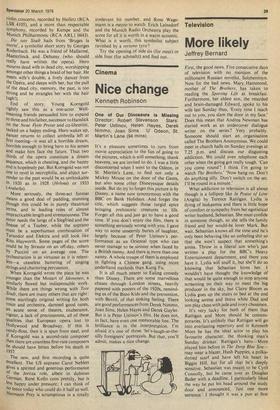Records
Alien Korn
Rodney Milnes
Die tote Stadt Korngold (RCA ARL3 E8.97)
'If Europe in the 'twenties had rejected Die tote Stadt as trivial candy-floss perhaps Hitler would not have got away with so much for so long.' Also sprach William Mann with reference to this new recording of Korngold's opera, and although he admits over-simplification, it still seems an unkind comment on the work of a composer who was chased ()kit of Europe, his career in ruins, by the Nazi hordes. If I said the same thing about Die Aegyptische Helena and Arabella, this redoubtable Straussian would be waiting for me with a hatchet at that nice Young's pub opposite the opera house. But those two (admittedlY better) post-World War I operas share extremely apposite subject matter with Korngold's: how on earth do you come to terms with an unfortunate immediate past? Strauss wasn't chased out of anywhere, which still isn't going to make me be beastly about him. No, if we are going to fling jibes like this around, we might look a little further down the cultural ladder, at Lehar for instance-1 mean, we all knoW that Wagner was a filthy Nazi because Hitler liked his music, but Hitler liked Lehar as well, and that composer has got away scot-free for far too long.
Korngold's career was extraordinary: aetat. ten, officially declared a genius bY Mahler; eleven, wrote a pantomime to be orchestrated by Schoenberg's brother-Inlaw and performed at the Court Opera; fourteen, an overture commissioned IV Nikisch; eighteen, two one-act operas premiered by Bruno Walter; twenty-three' the phenomenally successful Tote Stadt first given with Klemperer's wife in the lead, a role later to become an international vehicle for Maria Jeritza. Korngold then spent too much time rewriting other people's music: Offenbach (disastrous) and Mendelssohn's Dream (less so), which he arranged for Reinhardt. His last opera was banned by the Nazis (Vienna, 1938), and Reinhardt having given him the key t° Hollywood, he used it. His magnificent filra scores for Warner Bros are well enough. known. After the war came a delightful
violin concerto, recorded by Heifetz (RCA LSB 4105), and a more than respectable symphony, recorded by Kempe and the Munich Philharmonic (RCA ARL1 0443).
Die tote Stadt hails from 'Bruges la morte', a symbolist short story by Georges Rodenbach. He was a friend of MaHarm& Maeterlinck and Debussy (who should really have written the opera). Hero mourns dead wife in dead city, worshipping amongst other things a braid of her hair. He meets wife's double, a lively dancer from the Opera, and sleeps with her, but the pull of the dead city, memory, the past, is too strong and he strangles her with the hair (ugh!).
End of story. Young Korngold rightly saw this as a one-acter. Wellmeaning friends persuaded him to expand to three and his father, successor to Hanslick on the Neue Freie Presse and co-librettist, tacked on a habpy ending. Hero wakes up, dancer returns to collect umbrella left at first meeting—it was all a horrible dream, horrible enough to bring hero to his senses and make him face the future. Thus two thirds of the opera constitute a dream sequence, which is cheating, and the happy end is hopelessly pat. But Korngold was not one to revel in necrophilia, and abject surrender to the past would be as unthinkable In 1920 as in 1928 (Helena) or 1933 (Arabella).
More seriously, the three-act format means a good deal of padding, stunning though this could be in purely theatrical terms, and in leading roles of almost impracticable length and strenuousness. The tenor needs the lungs of a Siegfried and the finesse of a Tauber, while the soprano Must be a superhuman combination of Turandot and Elektra and still look like Rita Hayworth. Some pages of the score Could be by Strauss on an off-day, others by Puccini on an average one. The orchestration is as virtuoso as it is relentless—a ceaseless battering of singing Strings and chattering percussion.
When Korngold wrote the piece he was Younger than the Mozart of Idonzeneo, a similarly flawed but indispensable work. While there are things wrong with Tote Stadt, there are many others that are right : some startlingly original writing for both voice and orchestra, damned good tunes, an acute sense of theatre, exuberance, vigour, a lack of preciousness, all of these qualities that European opera lost to Hollywood pnd Broadway. If this is Candy-floss, then it is spun from steel, and if Korngold was a second-rate composer then there are countless first-rate composers he should have bitten before his death in 1957.
The new, and first recording is quite excellent. The US soprano Carol Neblett gives a spirited and generous performance " the Jeritza role, albeit in dubious German. Rene Kollo coos prettily, but is less happy under pressure; I can think of no tenor today who could do it half so well. Hermann Prey is scrumptious in a totally
irrelevant hit number, and Rose Wagemann is a mezzo to watch. Erich Leinsdorf and the Munich Radio Orchestra play the score for all it is worth in a warm acoustic. What is it worth, this symbolist subject ravished by a veristno tyro?
Try the opening of side six (for meat) or side four (for schmaltz) and find out.



































 Previous page
Previous page